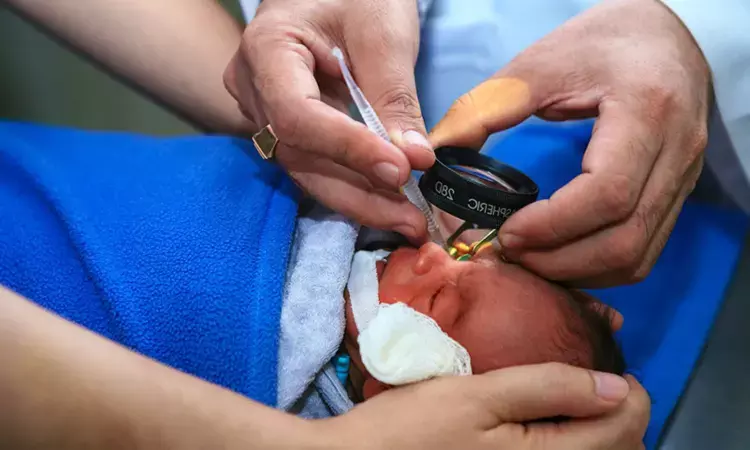- Home
- Medical news & Guidelines
- Anesthesiology
- Cardiology and CTVS
- Critical Care
- Dentistry
- Dermatology
- Diabetes and Endocrinology
- ENT
- Gastroenterology
- Medicine
- Nephrology
- Neurology
- Obstretics-Gynaecology
- Oncology
- Ophthalmology
- Orthopaedics
- Pediatrics-Neonatology
- Psychiatry
- Pulmonology
- Radiology
- Surgery
- Urology
- Laboratory Medicine
- Diet
- Nursing
- Paramedical
- Physiotherapy
- Health news
- Fact Check
- Bone Health Fact Check
- Brain Health Fact Check
- Cancer Related Fact Check
- Child Care Fact Check
- Dental and oral health fact check
- Diabetes and metabolic health fact check
- Diet and Nutrition Fact Check
- Eye and ENT Care Fact Check
- Fitness fact check
- Gut health fact check
- Heart health fact check
- Kidney health fact check
- Medical education fact check
- Men's health fact check
- Respiratory fact check
- Skin and hair care fact check
- Vaccine and Immunization fact check
- Women's health fact check
- AYUSH
- State News
- Andaman and Nicobar Islands
- Andhra Pradesh
- Arunachal Pradesh
- Assam
- Bihar
- Chandigarh
- Chattisgarh
- Dadra and Nagar Haveli
- Daman and Diu
- Delhi
- Goa
- Gujarat
- Haryana
- Himachal Pradesh
- Jammu & Kashmir
- Jharkhand
- Karnataka
- Kerala
- Ladakh
- Lakshadweep
- Madhya Pradesh
- Maharashtra
- Manipur
- Meghalaya
- Mizoram
- Nagaland
- Odisha
- Puducherry
- Punjab
- Rajasthan
- Sikkim
- Tamil Nadu
- Telangana
- Tripura
- Uttar Pradesh
- Uttrakhand
- West Bengal
- Medical Education
- Industry
Is there a link between pulmonary hypertension and anti-VEGF therapy for retinopathy of prematurity?

USA: Intraocular anti-vascular endothelial growth factor (VEGF) agents treat retinopathy of prematurity (ROP) in preterm infants. A recent study in JAMA Ophthalmology investigated whether anti-VEGF agents are associated with an increased risk of pulmonary hypertension (PH) needing medical therapy.
On investigation, Christopher R. Nitkin, University of Missouri Kansas City School of Medicine, Kansas City, and colleagues found that after adjusting for hospital and year, anti-VEGF therapy was not linked with greater use of pulmonary vasodilators. They suggest that exposure to anti-VEGF may be linked with PH. However, they mentioned the likelihood of residual confounding based on systemic comorbidities or hospital variation in practice could not be excluded.
Anti-vascular endothelial growth factor for ROP has potential and systemic advantages over laser, but the systemic risks of anti-VEGF therapy are not adequately quantified in preterm infants. Considering this, the research team investigated whether there was an association with an increased risk of pulmonary hypertension in preterm infants with ROP after treatment with anti-VEGF therapy versus laser treatment in a multicenter retrospective cohort study.
The study was performed at neonatal intensive care units of 48 children's hospitals in the US. Participants were preterm infants with gestational age at birth 22 0/7 to 31 6/7 weeks whose ROP was treated with anti-VEGF therapy or laser photocoagulation.
The researchers compared new receipt of pulmonary vasodilators at least seven days after ROP therapy between exposure groups, matched using propensity scores, and adjusted for hospital and birth year. To adjust for interhospital variation and secular trends in PH screening, the odds of receiving an echocardiogram after 30 days of age were also included.
The study led to the following findings:
- Among 1577 patients (55.9% male) who met thr inclusion criteria, 689 received laser photocoagulation and 888 received anti-VEGF treatment (95% bevacizumab, 5% ranibizumab).
- Patients were first treated for ROP at a median of 36.4 weeks postmenstrual age.
- Propensity score matching was done in a total of 982 patients (491 in each group)
- A model variance ratio of 1.15 indicated a good covariate balance.
- More infants who were given anti-VEGF therapy were treated for pulmonary hypertension, but after adjusting for hospital and year, this was not statistically significant (6.7% vs. 4.3%; adjusted odds ratio, 1.62).
Anti-VEGF therapy was not linked with higher use of pulmonary vasodilators after adjustment for year and hospital.
"The findings suggest exposure to anti-VEGF may be linked with pulmonary hypertension, although the likelihood of residual confounding based on hospital variation or systemic comorbidities can not be excluded," the researchers wrote in their study. "Future studies examining this possible adverse effect seem warranted."
Reference:
Nitkin CR, Bamat NA, Lagatta J, et al. Pulmonary Hypertension in Preterm Infants Treated With Laser vs Anti–Vascular Endothelial Growth Factor Therapy for Retinopathy of Prematurity. JAMA Ophthalmol. Published online October 06, 2022. doi:10.1001/jamaophthalmol.2022.3788
Dr Kamal Kant Kohli-MBBS, DTCD- a chest specialist with more than 30 years of practice and a flair for writing clinical articles, Dr Kamal Kant Kohli joined Medical Dialogues as a Chief Editor of Medical News. Besides writing articles, as an editor, he proofreads and verifies all the medical content published on Medical Dialogues including those coming from journals, studies,medical conferences,guidelines etc. Email: drkohli@medicaldialogues.in. Contact no. 011-43720751


